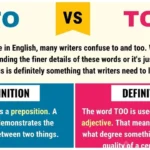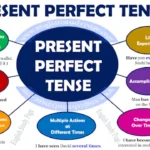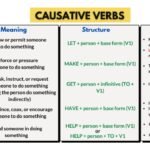Difference Between Should & Would: Use of Should: “Should” typically expresses obligation, duty, expectation, or advisability. It’s often used to indicate what is considered the right thing to do or the correct course of action in a given situation. For example, “You should study for your exams” implies it’s advisable or expected that you study to perform well.
Should is a Modal verb, which is used to show Advice or Suggestion, Wishes, Condition for A Suggestion and PR equation etc.
Deferent Between Should & Would
Use of Would: Would is a Modal Verb, Which is used to show Cretan Featurerity, past Form Of Shall or Will Series Of Past Habitual Action and To Know One’s wishes.
The word “would” is a modal auxiliary verb in English. It is used to express various ideas such as willingness, determination, future in the past, hypothetical situations, polite requests or offers, and habitual actions in the past. Here are some of its primary uses:
5 Rules Of Should
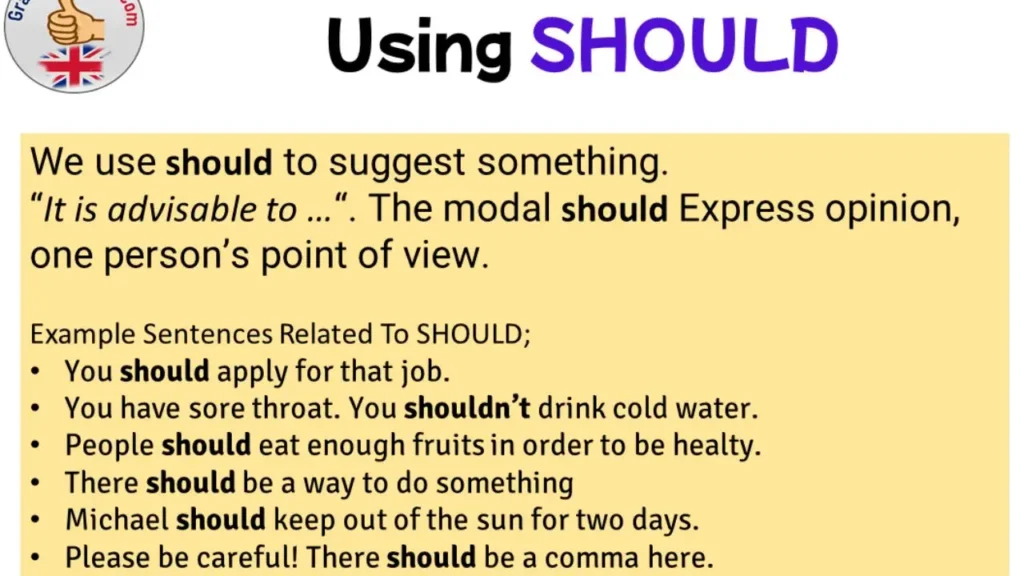
Rule 1 : To Make an Advice and Suggestion.
Example:
- You should drink more water every day.
- She should study for the test this weekend.
- They should save money for emergencies.
- He should exercise regularly to stay healthy.
- We should arrive early to get good seats.
Rule 2 : To Show Wishes
Example:
- I should visit Paris someday.
- She should meet her favorite author.
- They should explore new hobbies.
- He should travel more often.
- We should try different cuisines.
Rule 3 ; To Make Condition For A Suggestion.
Example:
- Should you feel unwell, see a doctor.
- Should they arrive early, prepare some snacks.
- Should it rain tomorrow, bring an umbrella.
- Should she need help, ask her to call me.
- Should he forget, remind him gently.
Rule 4 : To make a suggestion Tribulation
Example:
- To improve our productivity, let us suggest that the team should hold weekly meetings.
- For better health, let it be suggested that everyone should exercise regularly.
- To avoid misunderstandings, let us recommend that you should communicate clearly.
- For the success of the project, let it be advised that we should follow the timeline strictly.
- To enhance customer satisfaction, let it be proposed that the company should offer better support services
Rule 5 : To Show Regret.
Example:
- I should have studied harder for the exam.
- She should have called her parents more often.
- They should have left earlier to avoid the traffic.
- He should have apologized for his mistake.
- We should have saved more money for the trip.
5 Rules Of Would
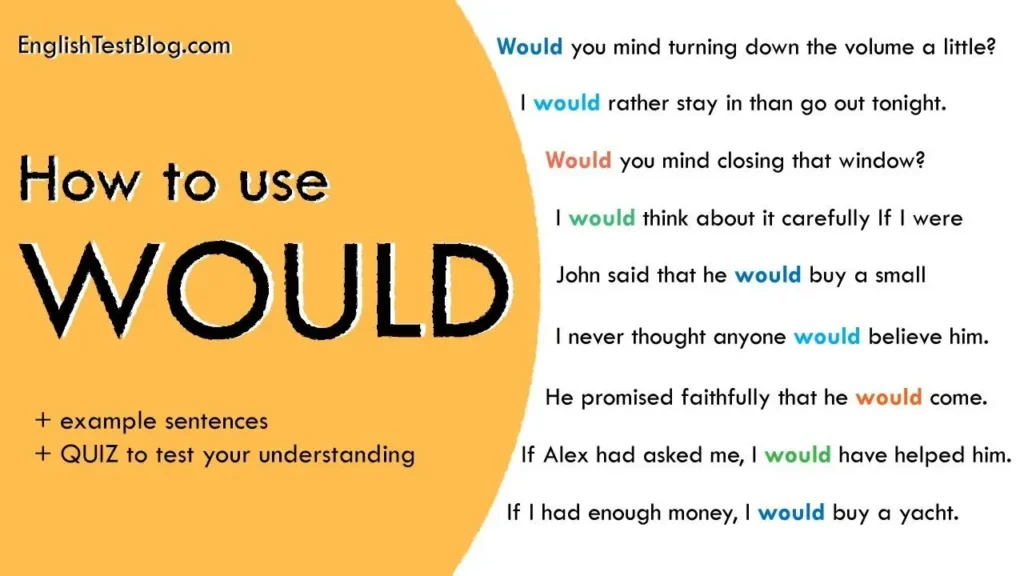
Rule 1 : To make a Cretan Featurerity.
Example:
- If it rains tomorrow, we would cancel the picnic.
- Should he apply for the job, he would likely get it.
- If they studied harder, they would pass the exam.
- If I had more time, I would travel the world.
- If she knew the answer, she would tell us.
Rule 2 : As The Past form of Shall or Will
Example:
- He said he would call me later.
- She promised she would finish the project on time.
- They knew they would enjoy the concert.
- I thought I would meet him at the café.
- We hoped
Rule 3 : To make series of past habitual Action.
Example:
- When I was a child, I would visit my grandparents every summer.
- Every evening, she would read a book before going to bed.
- They would go for a walk in the park after dinner.
- He would always play the guitar at family gatherings.
- We would have picnics by the lake on weekends.
Rule 4 : To Know One’s wishes
Example:
- Would you like to go to the movies tonight?
- Would she prefer tea or coffee with her breakfast?
- Would they enjoy visiting the new art gallery this weekend?
- Would he want to join us for dinner tomorrow?
- Would you appreciate some help with your project?
Rule 5 : To Express Idea or Wishes.
Example:
- I would like to visit Japan someday.
- She would dislike to work late every day.
- They would like to have more opportunities for travel.
- He would dislike to see anyone treated unfairly.
- We would like to learn a new language together.
Should VS Would In Tense
| Should | Would |
|---|---|
| Should is typically used for advice, recommendations, obligations, expectations, and regret. | Would is used for hypothetical situations, conditional statements, habitual actions in the past, Polite request or expirees of desire. |
Present Tense: Advice or Recommendation: “You should exercise regularly.” Obligation or Necessity: “Students should attend classes regularly.” Expectation: “The train should arrive on time.” Past Tense (Should + have + Past Participle): Regret: “I should have studied harder for the exam.” Unrealized Expectation: “They should have finished the project by now.” | Future in the Past (Would + base form of verb): Habitual Actions in the Past: “She would always visit her grandparents on weekends.” Conditional Statements: “If I won the lottery, I would buy a house.” Polite Requests or Offers: “Would you like some coffee?” Present or Future Tense (Would + base form of verb): Conditional Statements: “He said he would call me later.” Hypothetical Situations: “If it rained tomorrow, we would cancel the picnic.” Polite Expressions of Desire or Preference: “I would prefer tea, please.” |
Should VS Would in Voice
| Should | Would |
|---|---|
| You should complete the report by tomorrow.” (Active advice or recommendation) “Students should attend the meeting.” (Active suggestion or expectation) | “He would finish the work on time.” (Active habitual action in the past) “If I won the lottery, I would buy a new car.” (Active conditional statement) |
| Should is commonly used in both active and passive voices to indicate recommendations, suggestions, obligations, or expectations. | Would is used in both voices to express habitual actions in the past, conditional statements, or polite expressions of desire. |
| “The report should be completed by tomorrow.” (Passive suggestion or expectation) “Measures should be taken to prevent accidents.” (Passive recommendation or obligation) | “The work would be finished on time.” (Passive statement about a habitual action in the past) “If a mistake were made, corrections would be necessary.” (Passive conditional statement) |
Read Also:

